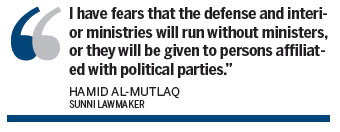Iraqi PM urged to name ministers
Defense, interior portfolios seen as crucial in fight against militants
Iraqi lawmakers urged the country's new prime minister on Tuesday to quickly name leaders for the defense and interior ministries, as doing so would boost efforts to fight extremist Sunni militants.
Addressing lawmakers late the previous night, Prime Minister Haider al-Abadi requested an additional week for the selection of these positions, saying that names have been proposed but the various political blocs have yet to reach a consensus.
Lawmakers approved all of the candidates proposed for the new government, with the exception of a few posts, including ministers of tourism and water resources.
The Islamic State group's lightning advance across much of northern and western Iraq has driven hundreds of thousands of people from their homes since June and prompted the United States to launch airstrikes on Aug 8 in hopes of boosting the waning efforts of Iraqi and Kurdish forces looking to regain control of lost territory.
Like many positions in the Iraqi government, the job of defense minister has, in recent years, traditionally been assigned to a Sunni, while the interior minister has been a Shiite. Lawmakers say the country is at too critical a juncture to focus on such practices.
"I have fears that the defense and interior ministries will run without ministers, or they will be given to persons affiliated with political parties instead of to people who are independent and professional, " Sunni lawmaker Hamid al-Mutlaq told The Associated Press by phone.
The Anbar province lawmaker called on al-Abadi's government to "prove its credibility and good intentions".
Salim al-Muslimawi, a Shiite lawmaker from Babil province, said any further delay in naming defense and interior ministers risks making the government appear weak and divided. He called the generally rapid selection of other Cabinet posts "a positive step in tackling the many problems facing the country".
Nouri al-Maliki, Iraq's prime minister for the past eight years, relinquished the post to his nominated replacement on Aug 14, ending a political deadlock that has plunged the country into uncertainty as it fights the Sunni militant insurgency.
The US and other countries have been pushing for a more representative government that will ease anger among Sunnis, who felt marginalized by al-Maliki's administration, which in turn helped to fuel the dramatic sweep by the Islamic State extremist group .
The insurgency seized Iraq's second-largest city, Mosul, and routed Iraq's beleaguered armed forces. Thousands of people have been killed, and more than 1.5 million have been displaced by the violence.
Iranian President Hassan Rouhani called the pending government formation a "new era" and expressed hope for closer relations between the two countries, Iran's official IRNA news agency reported on Tuesday.
The White House said President Barack Obama called al-Abadi on Monday to congratulate him and the Iraqi people on approval of a new government.
US Secretary of State John Kerry said the formation of the Iraqi government "is unquestionably a major milestone for Iraq, and what President Obama has made clear will be a cornerstone of our efforts" against the Islamic State militants.

(China Daily 09/10/2014 page10)














